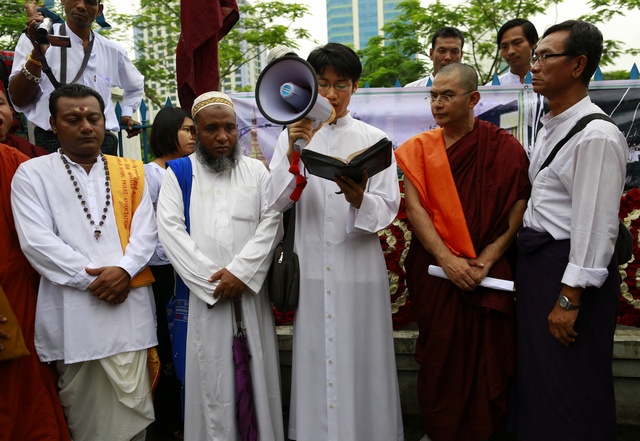Naypyidaw has rejected criticism by nine foreign embassies, accusing them of prejudging the election process in Burma and creating “misunderstandings and doubts based on ethnicity and religion”.
The haughty response by the Ministry of Foreign Affairs came after the embassies of Australia, Canada, Denmark, France, Norway, Japan, Sweden, the United Kingdom and the United States issued a joint statement earlier this week, saying they are “concerned about the prospect of religion being used as a tool of division and conflict during the campaign season”.
The foreign powers’ message did not point a finger directly, but is assumed to refer to the ascendancy of hardline Buddhist groups such as the Association for the Protection of Race and Religion, commonly known by its Burmese acronym Ma-Ba-Tha, which has built a strong following among devotees in the majority Buddhist nation built on a platform of anti-Muslim rhetoric.
Led by outspoken monk Wirathu, Ma-Ba-Tha has thrown its support behind the ruling Union Solidarity and Development Party for this year’s election, however other parties, most notably Aung San Suu Kyi’s National League for Democracy (NLD), have been accused of pandering to the group’s extremist values in a bid to consolidate support among Buddhist voters.
The NLD recently raised eyebrows when it failed to include any Muslims in its list of more than 1,130 candidates for the upcoming election.
The embassies’ criticism on 15 September noted that the 8 November election “will be a critical marker in Myanmar’s transition to democracy”, and voiced its support for “healthy competition” between political parties – though it called for electioneering to be conducted without stoking the already testy religious tensions in the country.
“Being democracies ourselves, we understand well the emotional dynamics of electoral politics,” the statement said. “Given the history of division and civil conflict in Myanmar, we call on all stakeholders — the Government, Union Election Commission, political parties, civic and religious leaders, and citizens alike — to promote a spirit of tolerance, mutual respect, and equality under the law to ensure the elections are peaceful and inclusive.”
Burma’s state media on Friday said the Ministry of Foreign Affairs was concerned that the joint statement could bring about “unwarranted, negative impacts” on the public, especially at a time when the election process is progressing “smoothly, effectively, and efficiently in a peaceful and positive environment”.
The report went on to cite President Thein Sein, who addressed the nation this week, saying that Burma “is a country where ethnic nationalities are residing side by side”. He went on to caution both political parties and voters, saying they should “refrain from causing disruption to those harmonious communities and wide diversity of beliefs.”
[related]
Burma’s election campaign period officially began on 8 September, however many Muslims see themselves as disenfranchised from the process. Of the 88 candidates whose applications to run in the general election were rejected by the election commission, a majority were Muslim. In fact, 17 of 18 candidates were disqualified from one party alone: the Democracy and Human Rights Party (DHRP), based in Rangoon and Maungdaw, which has a high Muslim membership and Rohingya rights agenda.
The matter of Rohingya citizenship is invariably the most contentious issue: hundreds of thousands of Muslims from the Rohingya community – referred to simply as “Bengalis” by many Burmese – have no voting rights despite the fact they were permitted to vote in previous elections.
The US State Department on Thursday expressed concern about the disqualification of Muslim candidates from the election.
“The move to disqualify some 100 candidates, through an opaque and discriminatory process, risks undermining the confidence of the Burmese people and the international community in these elections,” said State Department spokesman John Kirby.
“We urge the Burmese authorities to redouble their efforts to address these concerns and ensure that the upcoming elections constitute a step forward for the country,” he added.
Burma goes to the polls for what is otherwise deemed to be the most transparent and freely contested general election in its history.
Read more election coverage by DVB.



